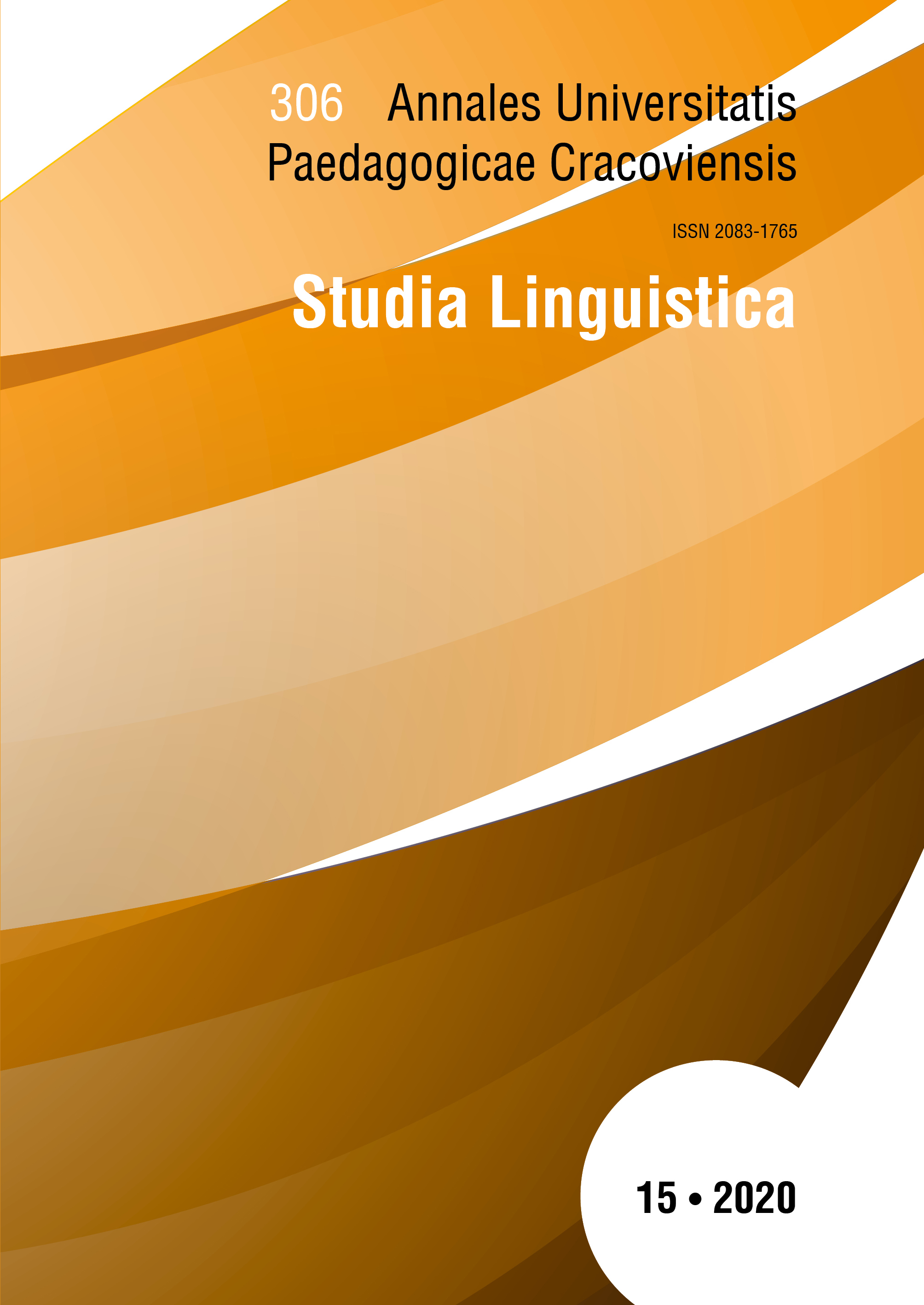Borrowings from Romance languages and their presence in educational materials for teaching and learning Polish as a foreign language
Main Article Content
Abstract
The article presents borrowings adopted from Romance languages wich can be found in educational aids for teaching Polish as a foreing language. The text focuses on the percentage share of borrowings in dictionnaries and beginners’ course books. It also concentrates on lists of words and topics in which those borrowings occur. The author emphasises the fact that in course books for teaching and learning Polish as a foreign language there are actually only proper loanwords while non assimilated and calques are missing. Besides neither metaphors nor foreign prefixes are not represented.
Downloads
Article Details
Author, submitting a text to the editorial board of the journal “Annales Universitatis Paedagogicae Cracoviensis. Studia Linguistica", certifies that the content of the article has not been published so far and that the work does not violate in any way the copyright or related rights of other person, as well as other rights of third parties, and that no one's rights to the work (or any part thereof) have been missed. After signing the contract, the property rights to the published materials are transferred to the Scientific Publisher of the University of the National Education Commission, Krakow.
“Annales Universitatis Paedagogicae Cracoviensis. Studia Linguistica” is an open access journal, and all its content is made available free of charge to users and institutions under the Creative Commons CC-BY-NC-ND 4.0 license (attribution, non-commercial use, no derivative works). Under this license, the authors agree that their work may be lawfully reused for any purpose, except for commercial purposes, without the prior consent of the author or publisher. Everyone can read, download, copy, print, distribute and process these works, provided that the author's marking and the original publication place are correct. Published texts may not be used to create derivative works (e.g. to translate and publish in another language without the consent of the publisher). This is in line with the BOAI (Budapest Open Access Initiative) definition. "Studia Linguistica" does not charge for submitting or processing articles.
References
Achtelik A., Serafin B., 2013, Miło mi panią poznać, Katowice.
Google Scholar
Bajerowa I., 2005, Zarys historii języka polskiego 1939–2000, Warszawa.
Google Scholar
Damborsk. J., 1974, Wyrazy obce w języku polskim, „Poradnik Językowy”, z. 7, s. 341–355.
Google Scholar
Długosz-Kurczabowa K., 2008, Wielki słownik etymologiczny języka polskiego, Warszawa.
Google Scholar
Dubisz S. red., 2003, Uniwersalny słownik języka polskiego, t. I–IV, Warszawa.
Google Scholar
ESOKJ, 2003 – Europejski System Opisu Kształcenia Językowego, uczenie się, nauczanie, ocenianie, Warszawa.
Google Scholar
Garncarek P., 2006, Przestrzeń kulturowa w nauczaniu języka polskiego jako obcego, Warszawa.
Google Scholar
Grzegorczykowa R., 1979, Zarys słowotwórstwa polskiego, Warszawa.
Google Scholar
Klemensiewicz Z., 1999, Historia języka polskiego, Warszawa.
Google Scholar
Kurzowa Z., 2005, Ilustrowany słownik podstawowy języka polskiego, Kraków.
Google Scholar
Maćkiewicz J., 1992, Wyrazy międzynarodowe a kształtowanie się europejskiej ligi słownikowej, „Język a Kultura”, t. 7: Kontakty języka polskiego z innymi językami na tle kontaktów kulturowych, red. J. Maćkiewicz, J. Siatkowski, Wrocław, s. 145–153.
Google Scholar
Maćkiewicz J., 2001, Wyrazy międzynarodowe we współczesnym języku polskim, [w:] Współczesny język polski, red. J. Bartmiński, Lublin, s. 555–562.
Google Scholar
Małolepsza M., Szymkiewicz A., 2010, Hurra!!! Po polsku 1, Kraków.
Google Scholar
Martyniuk W., 2004, A1 – Elementarny poziom zaawansowania w języku polskim jako obcym, Kraków.
Google Scholar
Miodunka W., 2005, Cześć, jak się masz, Kraków.
Google Scholar
Porayski-Pomsta J., 2006, Słownictwo pochodzenia obcego w Uniwersalnym słowniku języka polskiego pod redakcją Stanisława Dubisza, „Poradnik Językowy”, z. 4, s. 58–69.
Google Scholar
Porayski-Pomsta J., 2007, Zapożyczenia leksykalne z języka francuskiego we współczesnej polszczyźnie. Charakterystyka strukturalno-semantyczna, „Poradnik Językowy”, z. 5, s. 55–65.
Google Scholar
Walczak B., 2008, Zarys dziejów języka polskiego, Wrocław.
Google Scholar
Waszakowa K., 2005, Przejawy internacjonalizacji w słowotwórstwie współczesnej polszczyzny, Warszawa.
Google Scholar
Witaszek-Samborska M., 1993, Zapożyczenia z różnych języków we współczesnej polszczyźnie, Poznań.
Google Scholar
Zgółkowa H., 2008, Podstawowy słownik języka polskiego z zarysem gramatyki polskiej, Poznań.
Google Scholar
